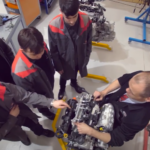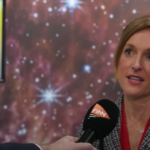As the industry powers towards the net zero target of 2050, there’s a lot of pressure on the manufacturers to deliver the technology that we need to get there. And manufacturers like CFM have set themselves big targets when it comes to delivering emission reductions – it promised 15% fuel improvements with its Leap engine.
Ambitious target
CFM’s president and CEO Gaël Méheust told FINN, “It was actually a very ambitious target, and it was not very obvious at the time that we could make it. In the past we’ve had the development of engines and we haven’t met the targets we set ourselves. When it comes to the Leap, we met the 15% fuel improvement target compared to the previous generation of engines as we promised. The interesting thing is, I travel a lot and meet customers all over the world and a lot of them are telling me, why are you only talking about 15% because when we use an airplane Leap-powered versus a airplane CFM-powered, we see more than that – all the way to 20%.”
That feedback has been positive for CFM, but the company isn’t stopping there. It launched the Rise program during Covid, which will see the company develop an engine by 2035 that is 20% better in fuel performance – and therefore in CO2 performance – compared to the best engine today, which is the Leap, according to Méheust.
The company has done more than 100 tests and currently has 25 tests being run in parallel that will be incorporated into the future engines. “Our goal is 20% [fuel improvement] – it’s a huge goal but we are all confident that we can make it,” Méheust added.
Airbus partnership
The company is also looking into developing hydrogen as a viable fuel for aviation, and it has a collaborative agreement with Airbus where it will test an engine on the A380 testbed that will be fuelled with hydrogen.
“The first step – the quick win – is sustainable aviation fuel and probably later on in time, more towards the 2050 goal, hydrogen could step in,” said Méheust.

